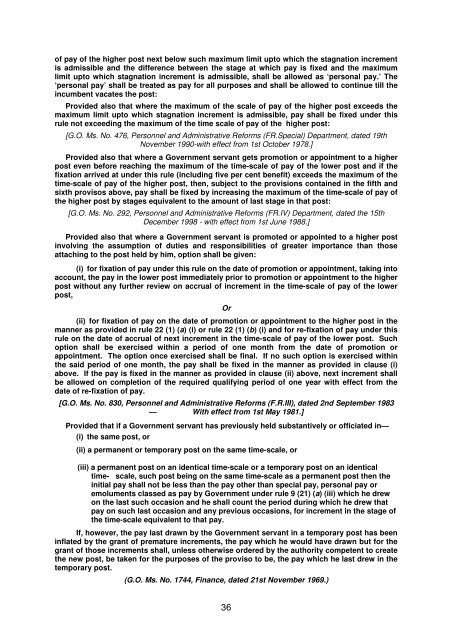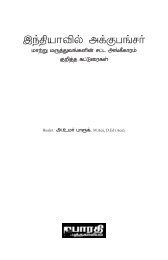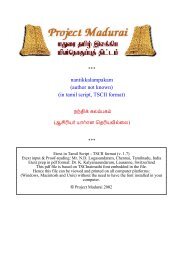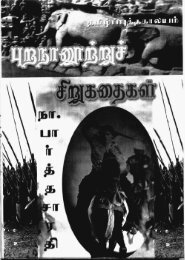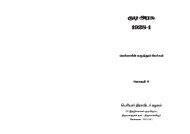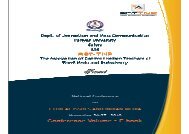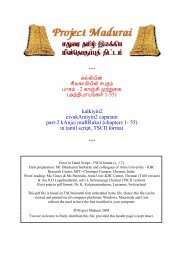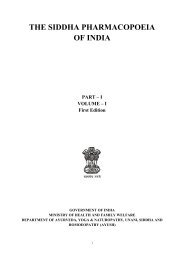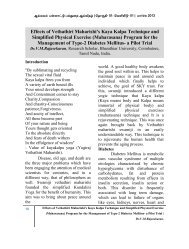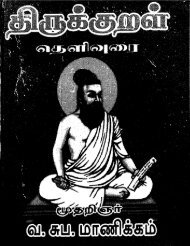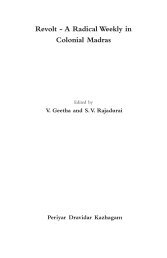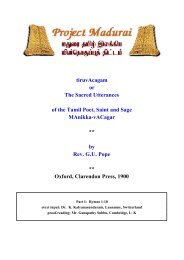THE FUNDAMENTAL RULES OF THE TAMIL NADU GOVERNMENT
THE FUNDAMENTAL RULES OF THE TAMIL NADU GOVERNMENT
THE FUNDAMENTAL RULES OF THE TAMIL NADU GOVERNMENT
- No tags were found...
You also want an ePaper? Increase the reach of your titles
YUMPU automatically turns print PDFs into web optimized ePapers that Google loves.
of pay of the higher post next below such maximum limit upto which the stagnation incrementis admissible and the difference between the stage at which pay is fixed and the maximumlimit upto which stagnation increment is admissible, shall be allowed as ‘personal pay.’ The‘personal pay’ shall be treated as pay for all purposes and shall be allowed to continue till theincumbent vacates the post:Provided also that where the maximum of the scale of pay of the higher post exceeds themaximum limit upto which stagnation increment is admissible, pay shall be fixed under thisrule not exceeding the maximum of the time scale of pay of the higher post:[G.O. Ms. No. 476, Personnel and Administrative Reforms (FR.Special) Department, dated 19thNovember 1990-with effect from 1st October 1978.]Provided also that where a Government servant gets promotion or appointment to a higherpost even before reaching the maximum of the time-scale of pay of the lower post and if thefixation arrived at under this rule (including five per cent benefit) exceeds the maximum of thetime-scale of pay of the higher post, then, subject to the provisions contained in the fifth andsixth provisos above, pay shall be fixed by increasing the maximum of the time-scale of pay ofthe higher post by stages equivalent to the amount of last stage in that post:[G.O. Ms. No. 292, Personnel and Administrative Reforms (FR.IV) Department, dated the 15thDecember 1998 - with effect from 1st June 1988.]Provided also that where a Government servant is promoted or appointed to a higher postinvolving the assumption of duties and responsibilities of greater importance than thoseattaching to the post held by him, option shall be given:(i) for fixation of pay under this rule on the date of promotion or appointment, taking intoaccount, the pay in the lower post immediately prior to promotion or appointment to the higherpost without any further review on accrual of increment in the time-scale of pay of the lowerpost,Or(ii) for fixation of pay on the date of promotion or appointment to the higher post in themanner as provided in rule 22 (1) (a) (i) or rule 22 (1) (b) (i) and for re-fixation of pay under thisrule on the date of accrual of next increment in the time-scale of pay of the lower post. Suchoption shall be exercised within a period of one month from the date of promotion orappointment. The option once exercised shall be final. If no such option is exercised withinthe said period of one month, the pay shall be fixed in the manner as provided in clause (i)above. If the pay is fixed in the manner as provided in clause (ii) above, next increment shallbe allowed on completion of the required qualifying period of one year with effect from thedate of re-fixation of pay.[G.O. Ms. No. 830, Personnel and Administrative Reforms (F.R.III), dated 2nd September 1983— With effect from 1st May 1981.]Provided that if a Government servant has previously held substantively or officiated in—(i) the same post, or(ii) a permanent or temporary post on the same time-scale, or(iii) a permanent post on an identical time-scale or a temporary post on an identicaltime- scale, such post being on the same time-scale as a permanent post then theinitial pay shall not be less than the pay other than special pay, personal pay oremoluments classed as pay by Government under rule 9 (21) (a) (iii) which he drewon the last such occasion and he shall count the period during which he drew thatpay on such last occasion and any previous occasions, for increment in the stage ofthe time-scale equivalent to that pay.If, however, the pay last drawn by the Government servant in a temporary post has beeninflated by the grant of premature increments, the pay which he would have drawn but for thegrant of those increments shall, unless otherwise ordered by the authority competent to createthe new post, be taken for the purposes of the proviso to be, the pay which he last drew in thetemporary post.(G.O. Ms. No. 1744, Finance, dated 21st November 1969.)36


